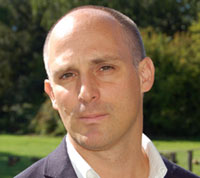Hidden dangers lurk in Denmark

Recent news events have shaken "deeply neurotic" columnist Michael Booth's perceptions of his adopted homeland. Is Denmark less safe than we've been led to believe?
No earthquakes, snakes, or hurricanes: that was the pledge from my Danish wife before she lured me to live in Denmark. She had me at ‘earthquakes’. She knew me well, even then. I am a deeply neurotic man. Terrified, if not of my own shadow, then definitely of other people’s. A great big jelly. A scaredy cat. A wimp in a big girl’s blouse. I crave safety and security, seek always to minimise risk, and avoid the merest whiff of danger. I am a fully paid up member of the Self Preservation Society. So Denmark suited me perfectly. There were no dangerous animals, little crime, no football hooligans, no wars, cholera, flooding and most famously of all in this, the self-proclaimed happiest country in the world, trust levels were also the highest on the planet. I would be able to leave my front door unlocked, purchase goods confident that they would be safe, and live my life secure in the knowledge that the politicians who ran the country were utterly without reproach in matters of morality and ethics. Last week somewhat tarnished that illusion. First came the news that 12 people had died as a result of a listeria outbreak from a processed meat company already found guilty of a dubious practice (mixing pork and beef without labelling the products appropriately). This was Jørn A. Rullepølser A/S - now, at last, closed - which sold its products to SuperBest and some Spar supermarkets. When asked to defend its systematic mistakes, the company’s CEO admitted he could never guarantee hygiene standards because "it could be that [the cleaner’s] grandmother died the day before". To which one can’t help but ask, "Did she die of listeria?" A total of 24 people were actually infected with the potentially fatal bacteria, luckily 12 survived, but what most shocked me about the story was that it took so long for it to break in the Danish media: the first case was picked up by State Serum Institute in September. That to me smacks of a worrying complacency. Then came a report which placed Denmark second only to Greece in terms of house break-ins. That was pretty disturbing for someone who lies awake at night alert to every bump and creak from beyond the bedroom door, but for me the most chilling aspect of the story was the allegation that the Danish police don’t even bother to investigate robberies of less than 100,000 kroner (which, now I think of it, means that the robbers would have to steal my actual house to be investigated). And, now, what to make of the murky deal to save Viborg football club by its then mayor - the new leader of the Conservatives - Søren Pape Poulsen, which involved selling the naming rights to their stadium to a local energy company for a knock-down rate. It all sounds positively House of Cards to me. The first two stories are, of course, of greatest concern to those of a frail and nervous disposition, fond of processed pork products and sleeping safely at night without fear of being bludgeoned to death for the sake of an old Samsung flat screen TV and some knackered IKEA cutlery. I’m not sure what to do about the number of burglaries, although perhaps the Danes shouldn’t be so trusting after all, but the listeria outbreak is, I am afraid, a symptom of a far deeper and more widespread problem within the Danish food industry: the agricultural lobby, headed by the Danish Agriculture and Food Council (Landbrug & Fødevarer), wields a disproportionate amount of influence and power in Christiansborg. Though Danish agriculture has declined in terms of its contribution to the economy over the last few decades, its farmers still have an uncanny ability to terrify the politicians in Denmark, and no sector of Danish agriculture is more powerful, sacred even, than the pork industry. As a result, it has been allowed to get away with practices - such as the clipping of piglets’ tails and the use of antibiotics - which could have serious long term health consequences for the population (the antibiotics that is, not the tail-docking). But at least there are no earthquakes, snakes or hurricanes. Except, there are. In recent years I have experienced all three right here in Denmark. Perhaps it’s time to reconsider Sweden…  Michael Booth is the author of The Almost Nearly Perfect People: The Truth About the Nordic Miracle available now on Amazon and is a regular contributor to publications including the Guardian and Monocle.
Michael Booth is the author of The Almost Nearly Perfect People: The Truth About the Nordic Miracle available now on Amazon and is a regular contributor to publications including the Guardian and Monocle.
Comments
See Also
No earthquakes, snakes, or hurricanes: that was the pledge from my Danish wife before she lured me to live in Denmark.
She had me at ‘earthquakes’.
She knew me well, even then. I am a deeply neurotic man. Terrified, if not of my own shadow, then definitely of other people’s. A great big jelly. A scaredy cat. A wimp in a big girl’s blouse. I crave safety and security, seek always to minimise risk, and avoid the merest whiff of danger. I am a fully paid up member of the Self Preservation Society.
So Denmark suited me perfectly. There were no dangerous animals, little crime, no football hooligans, no wars, cholera, flooding and most famously of all in this, the self-proclaimed happiest country in the world, trust levels were also the highest on the planet. I would be able to leave my front door unlocked, purchase goods confident that they would be safe, and live my life secure in the knowledge that the politicians who ran the country were utterly without reproach in matters of morality and ethics.
Last week somewhat tarnished that illusion.
First came the news that 12 people had died as a result of a listeria outbreak from a processed meat company already found guilty of a dubious practice (mixing pork and beef without labelling the products appropriately). This was Jørn A. Rullepølser A/S - now, at last, closed - which sold its products to SuperBest and some Spar supermarkets.
When asked to defend its systematic mistakes, the company’s CEO admitted he could never guarantee hygiene standards because "it could be that [the cleaner’s] grandmother died the day before". To which one can’t help but ask, "Did she die of listeria?" A total of 24 people were actually infected with the potentially fatal bacteria, luckily 12 survived, but what most shocked me about the story was that it took so long for it to break in the Danish media: the first case was picked up by State Serum Institute in September. That to me smacks of a worrying complacency.
Then came a report which placed Denmark second only to Greece in terms of house break-ins. That was pretty disturbing for someone who lies awake at night alert to every bump and creak from beyond the bedroom door, but for me the most chilling aspect of the story was the allegation that the Danish police don’t even bother to investigate robberies of less than 100,000 kroner (which, now I think of it, means that the robbers would have to steal my actual house to be investigated).
And, now, what to make of the murky deal to save Viborg football club by its then mayor - the new leader of the Conservatives - Søren Pape Poulsen, which involved selling the naming rights to their stadium to a local energy company for a knock-down rate.
It all sounds positively House of Cards to me.
The first two stories are, of course, of greatest concern to those of a frail and nervous disposition, fond of processed pork products and sleeping safely at night without fear of being bludgeoned to death for the sake of an old Samsung flat screen TV and some knackered IKEA cutlery.
I’m not sure what to do about the number of burglaries, although perhaps the Danes shouldn’t be so trusting after all, but the listeria outbreak is, I am afraid, a symptom of a far deeper and more widespread problem within the Danish food industry: the agricultural lobby, headed by the Danish Agriculture and Food Council (Landbrug & Fødevarer), wields a disproportionate amount of influence and power in Christiansborg. Though Danish agriculture has declined in terms of its contribution to the economy over the last few decades, its farmers still have an uncanny ability to terrify the politicians in Denmark, and no sector of Danish agriculture is more powerful, sacred even, than the pork industry. As a result, it has been allowed to get away with practices - such as the clipping of piglets’ tails and the use of antibiotics - which could have serious long term health consequences for the population (the antibiotics that is, not the tail-docking).
But at least there are no earthquakes, snakes or hurricanes.
Except, there are. In recent years I have experienced all three right here in Denmark.
Perhaps it’s time to reconsider Sweden…
 Michael Booth is the author of The Almost Nearly Perfect People: The Truth About the Nordic Miracle available now on Amazon and is a regular contributor to publications including the Guardian and Monocle.
Michael Booth is the author of The Almost Nearly Perfect People: The Truth About the Nordic Miracle available now on Amazon and is a regular contributor to publications including the Guardian and Monocle.
Join the conversation in our comments section below. Share your own views and experience and if you have a question or suggestion for our journalists then email us at [email protected].
Please keep comments civil, constructive and on topic – and make sure to read our terms of use before getting involved.
Please log in here to leave a comment.